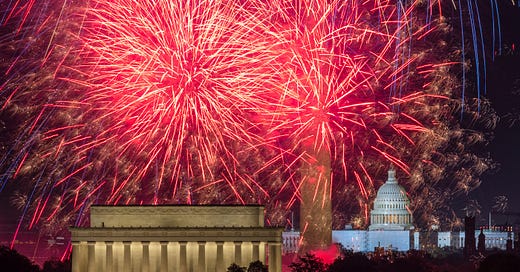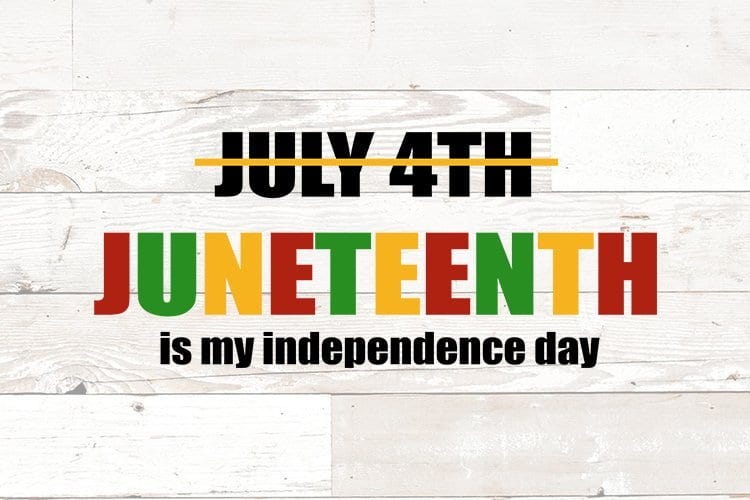Let us begin with a simple proposition: a nation that loses grip on historical truth will soon lose the very liberty it claims to defend. In the case of Juneteenth, the official narrative peddled by government institutions and media organs insists that June 19, 1865, marked the end of slavery in the United States. It did not. The same narrative suggests that slaves in Galveston, Texas, were ignorant of their freedom until Union General Gordon Granger arrived and read General Order No. 3 from a balcony. That too is false.
So, why the deception? Why enshrine a historical inaccuracy into federal law, complete with flags, hashtags, and official observances? The answer lies not in a celebration of liberty, but in its quiet replacement. Juneteenth, far from being a spontaneous commemoration of emancipation, is a politically engineered holiday whose true function is to decenter the Fourth of July, recast the American Founding as a fraud, and promote a new narrative steeped not in liberty, but in grievance. At bottom, Juneteenth is not about celebrating the end of slavery. It is about reinterpreting the American project itself.
To understand why, we must begin by clarifying the two foundational myths upon which Juneteenth rests.
First, it is not true that the enslaved people of Galveston only discovered they were free on June 19, 1865. Historical evidence clearly demonstrates that the Emancipation Proclamation was published widely in Texas newspapers, including the Houston Tri-Weekly Telegraph as early as February 2, 1863. Galveston, a major port city, had direct access to this information. Moreover, slave narratives collected by the Works Progress Administration confirm that news traveled fast among the enslaved. Felix Haywood, a former slave from Texas, remembered vividly, “Oh, we knowed what was goin' on in it all the time... We had papers in them days jus' like now.” Slaves did not live in informational quarantine.
Second, and more damning, is the simple historical fact that slavery did not end on June 19, 1865. That date marks the enforcement of the Emancipation Proclamation in Texas, and only in Texas. Slavery persisted in Union-loyal states such as Delaware and Kentucky for nearly six more months. On June 19, 1865, over 227,000 Americans remained legally enslaved. Not until the ratification of the 13th Amendment on December 6, 1865, were those people truly and legally freed. If one were seeking a holiday to commemorate the end of slavery in America, December 6 would be the logical choice. Yet Juneteenth was chosen. Why?
To answer that question, one must consider the architects of Juneteenth’s national elevation. The push to federalize the holiday accelerated in the wake of the George Floyd riots of 2020, a period marked not by unity but by division, not by historical celebration but by symbolic iconoclasm. Statues of Washington, Jefferson, and Lincoln were defaced or toppled. The American flag itself was reimagined by progressive activists as a symbol of systemic oppression. In that context, Juneteenth became useful not as a historical commemoration, but as a cultural replacement, a new moral center.
To be clear, there is nothing inherently wrong with commemorating emancipation. But Juneteenth does not do this honestly. Instead, it inserts a deliberately misleading narrative into the American consciousness, one that suggests slavery ended not through constitutional means, not through war and statesmanship, but through a lone Union general bringing news to an isolated group of ignorant slaves. It recasts emancipation not as the culmination of the American project, but as a necessary correction to its founding. In doing so, it subtly poisons the well of American civic pride.
The mainstream media’s repeated claim that Juneteenth marked the end of slavery in America is not just mistaken, it is irresponsible. Worse, it reveals an underlying ideological motive. If the Fourth of July celebrates the birth of a nation founded on liberty, Juneteenth is fast becoming its foil, a holiday that implies that liberty was a lie, that 1776 was hypocrisy incarnate, and that true justice only arrived by federal bayonet in Galveston. Such framing is not merely revisionist; it is revolutionary.
Cultural Marxism is often derided as a conspiratorial term, but the essence of the critique is straightforward. In place of economic revolution, it promotes cultural revolution: dismantling Western traditions, symbols, and moral narratives to clear the way for a new social order. Juneteenth fits neatly within this paradigm. It is not an apolitical holiday. It is an ideological tool, useful for reframing American identity around victimhood and systemic injustice.
If this seems harsh, consider the coordinated media campaign surrounding Juneteenth. NPR, PBS, and the New York Times have all run pieces uncritically parroting the falsehood that June 19 marked the end of slavery in the US. School curricula increasingly highlight Juneteenth while diminishing Independence Day. Government offices fly the Juneteenth flag, a symbol that didn’t exist two decades ago, with greater enthusiasm than they display the American flag. Even corporations like Amazon and Nike promote Juneteenth with the kind of vigor once reserved for the Fourth of July. None of this is accidental.
The effect, intentional or not, is to suggest that the real America began not in 1776 with the Declaration of Independence, but in 1865, at the end of slavery. This is the same conceptual pivot that underlies the New York Times’ 1619 Project, which argues that America’s true founding began with the arrival of the first slaves, not the drafting of the Constitution. That project, like Juneteenth, seeks to invert the American story: liberty becomes accidental, oppression becomes essential.
There is a revealing story about how Donald Trump first encountered the push for Juneteenth as a national holiday. In 2020, during the planning of a campaign rally in Tulsa, Oklahoma, originally scheduled for June 19, Trump was unaware of the date's political and cultural significance. A Black Secret Service agent informed him of the controversy, explaining the nature of Juneteenth and why activists were pushing its prominence. Trump promptly rescheduled the rally to June 20, citing respect for the holiday. He later quipped that he had made Juneteenth "very famous" by drawing national attention to it. Far from resisting its elevation, Trump was initially unaware of the ideological momentum behind it, which only underscores how rapidly the holiday was weaponized by political elites to rewrite national symbolism. When Juneteenth became a federal holiday in 2021, it was not because the public demanded it, but because the political class saw its utility in reframing the American narrative.
The irony is that the true story of American emancipation is one of triumph: a brutal war fought to extend the promise of the Declaration to all citizens. Lincoln understood this. So did Frederick Douglass. So did the men who fought and died at Gettysburg. That story deserves honor. But Juneteenth does not tell it. Instead, it substitutes a fable: a handful of slaves in a remote part of Texas learning, belatedly and for the first time, that they were free. It’s a compelling story, but it is not history.
A better holiday might be "December Sixth," marking the actual legal end of slavery. It would anchor emancipation in the text of the Constitution rather than the dramatic flourish of a Union general’s order. But such a holiday would not serve the ideological purpose Juneteenth now fulfills. It would point us back to the genius of the Founding and the fulfillment of its promises, not away from it.
Juneteenth, as currently framed, is a myth masquerading as a milestone. It deserves scrutiny, not sanctification. For history's sake, and liberty's, we must insist on truth.
If you enjoy my work, please consider subscribing https://x.com/amuse.






